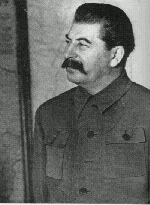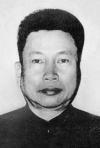Stalin, Mao Zedong and Pol Pot
Were Stalin, Mao Zedong and Pol Pot atheists? Did their atheism have an impact on their actions and subsequent atrocities?
While it is true that Joseph Stalin (1879-1953), Mao Zedong (1893-1976) and Pol Pot (1925-1998) were all atheists, this is not the only thing they have in common. They were also men, political leaders and communists. Merely citing common denominators does not establish the cause of their actions. It is important to consider what was the main driving force in their committing atrocities against their own people.
One could make a valid claim that since Stalin attended a Russian orthodox seminary (from 1894 to 1899) as a teenager in Tiflis, the dogmatic black or white outlook of the world influenced his subsequent actions. As the historian Alan Bullock in his book Hitler and Stalin: Parallel Lives (1991) explained:
The fact that it was a Church education helped to form the mind of a man who was to become known for his dogmatism and his propensity for seeing issues in absolute terms, in black and white. Anyone reading Stalin's speeches and writings will notice their catechistic structure, the use of question and answer, the reduction of complex questions to a set of simplified formulas, the quoting of text to support his arguments. The same Church influence has been noted by biographers in his style of speaking or writing Russian: 'declamatory and repetitive, with liturgical overtones.'
However the main influence on all these three men were likely dogmatic Marxism-Communism. Joseph M. Bochenski in his essay "A Critique of Communism" in the book Outline of Communism clearly showed what the shortcomings of this system are:
Firstly, communists are prone to oversimplification. Complex problems of the real world are explained in simplistic terms. Thus the communist eschatology of a classless society leads them to believe that collectivization is the main source of human happiness. Never mind the fact that each human beings have different - and opposing - dreams, goals and desires. They also believe that all problems of labor can be resolved by nationalization of all industries and the banning of private ownership. This saps the human spirit of the will to excel. This simplistic outlook spills into their belief about moral issues. Since communism is the ultimate good, anyone who is opposed to it must necessarily be evil. Like religious fundamentalists, to the communists everything is in black and white. "You are either with us or against us."
Secondly, as can be seen above, communism resembles very closely the dogmatic faith of religious fundamentalist. It has, like other fundamentalist religions, a list of sacred writings known as the "communist classics". Infallible authority is ascribed to these writings. It pretends to represent the absolute truth by calling itself a "science". Yet it proceeds in the manner of a faith. Indeed, Einstein even commented on this:
- Albert Einstein, Out Of My Later Years:
|
|---|
Most importantly, in no case is atheism central to the building of these dogmatic positions. Atheism embodies no particular ideology, world view or dogma and cannot be justified as any significant factor in the activities of these people. If anything, the lack of belief in a supernatural overlord leaves one to respect the importance of all of mankind peacefully coexisting, because unlike in religious doctrine, the penalties one may face for immoral acts are often levied in the material world, during the life of the perpetrator.
Indeed to the founder of communist doctrines, Karl Marx (1818-1883), atheism, was just a stage on the path to communism, and it was ultimately "unreal" and "no longer needed" by socialism and communism. This is what Karl Marx himself said about atheism: Atheism as a denial of this unreality; has no longer any meaning, for atheism is a denial of God and tries to assert through this negation the existence of man; but socialism as such no longer needs this mediation...
It is important to pause for a moment and consider this statement carefully. If Karl Marx, the intellectual founder of Marxism and communism, repudiated atheism as meaningless and no longer needed, how then could atheism be considered the cause of the atrocities committed under communism?
This site costs a lot of money in bandwidth and resources. We are glad to bring it to you free, but would you consider helping support our site by making a donation? Any amount would go a long way towards helping us continue to provide this useful service to the community.
Click on the Paypal button below to donate. Your support is most appreciated! |
|---|





